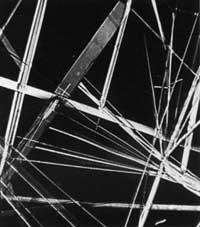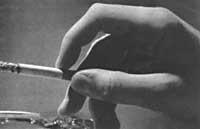Sperm from smokers can cause problems
1993/05/01 Elhuyar Zientzia Iturria: Elhuyar aldizkaria
Smokers can transmit problems not only to their children, but also to future generations. This was stated at a conference by biochemist Bruce Ames in Melbourne.
Ames referred to several studies conducted in North Carolina. These studies reviewed the situation of 15,000 children born between 1959 and 1966. It was observed that the number of hanging lips or defective hearts among the children of those who smoked more than twenty cigarettes a day was double that of the children of those who did not smoke, and that the risk of being born with a narrow urethra was two or two times more than that of the children.

Another study analyzed 220 young people with cancer younger than 14 years. In this research, the following results were obtained: among young people who suffered leukemias or cancer of lymph nodes, those who had been smokers were twice as many as those who had a father who did not smoke.
“I think there is a direct relationship between birth defects, childhood cancer and smokers,” said Ames. He added that the same could not be said about females.
Many of the damage caused by burning is due to the oxidation of the material contained in the lit cigarette. Free oxygen is very reactive and can cause great damage to DNA. Some by-products of metabolism such as superoxide are radical hydrogen and hydrogen peroxide, mutants. They oxidize DNA, producing in some points of the molecule the so-called “oxidation lesions”. This can occur 10,000 times a day, but normally enzymes repair damaged parts. Problems occur when oxidation is faster than repair.
The blood contains antioxidants such as vitamin C, vitamin E, and beta-carotene. These antioxidants are used in smokers to neutralize oxidable compounds. In order for smokers to maintain vitamin C in their blood, they should consume this vitamin three times more. This is not possible, so the concentration of antioxidants decreases in human cells, increasing the risk of lesions in the DNA.
In addition, especially, oxidation can cause damage to sperm cells causing genetic alterations.

Gai honi buruzko eduki gehiago
Elhuyarrek garatutako teknologia





